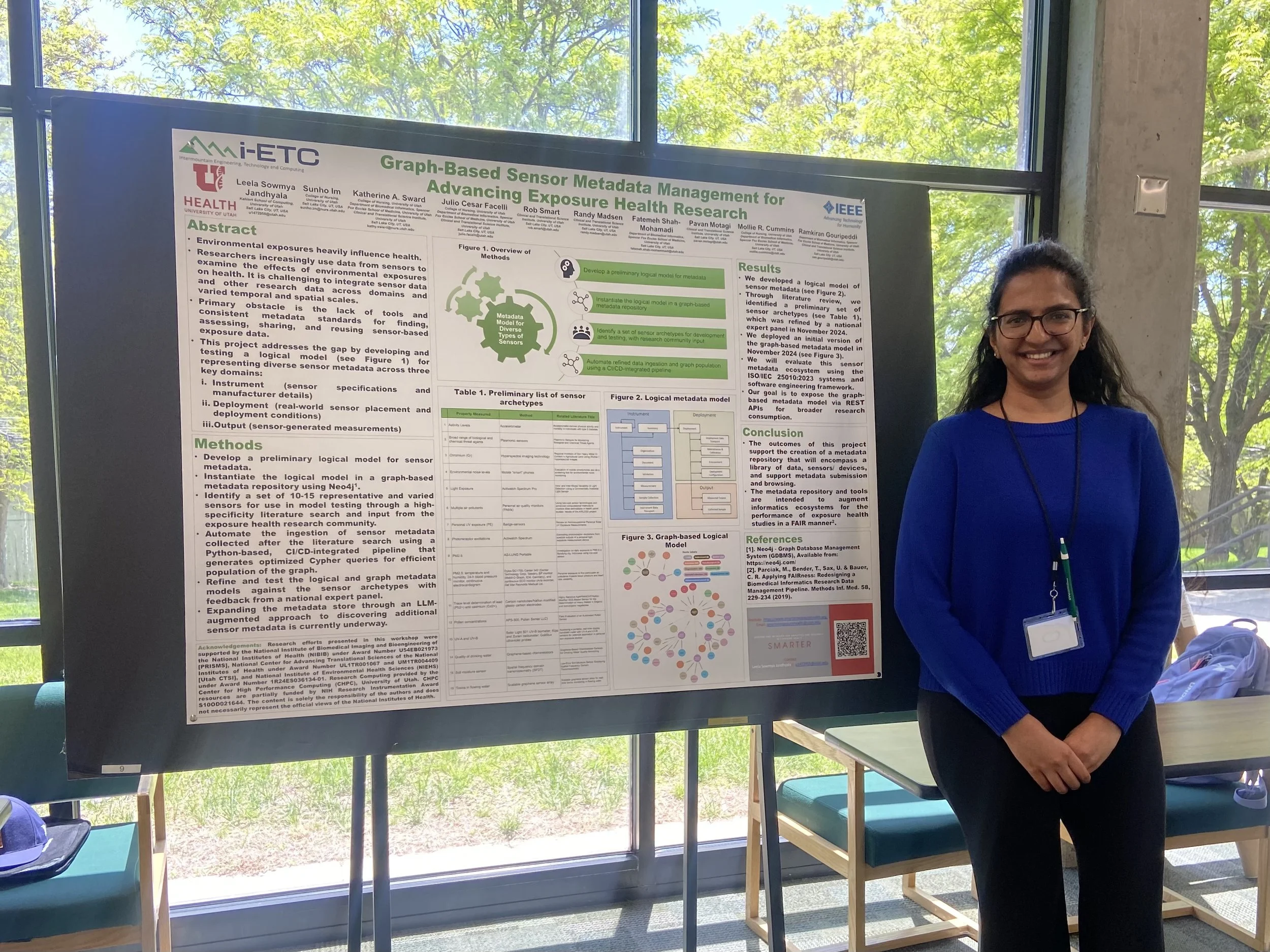SMARTER Updates - July 2025
Greetings from the SMARTER team! Our project, funded by NIEHS and initiated in 2024, is developing community-driven, shared, generalizable metadata and data management tools that support reproducible exposure health research. Sensor metadata is a major focus.
Project Updates
We are continuing development of the sensor metadata repository, and beginning user-centered design of the sensor library interface. In preparation, we onboarded a software developer and we will soon welcome a dedicated user interface/ user experience designer. If you’d like to contribute by participating in remote, user-centered design sessions where you would briefly test software designs or features, please let us know!
SMARTER Research at ISES-ISEE 2025
This summer, we are headed to the ISES-IEEE 2025 meeting in Atlanta, GA to exchange new findings and innovations with the exposure health research community. Several members of our team, including Drs. Ram Gouripeddi, Mollie Cummins, & Fatemah Shah will be presenting work from SMARTER. At the heart of all three presentations is a commitment to scalable, interoperable, and community-driven research tools that make exposure science more efficient and impactful. We look forward to connecting with you at ISES-ISEE 2025 in Atlanta. Join us to explore these innovations and help shape the direction of exposure health informatics! Here’s a preview of our poster presentations at ISES-IEEE 2025.
-
In exposure health studies, detailed sensor metadata is vital—but often trapped in scattered and non-standardized sources like PDFs, websites, and technical catalogs. Manual metadata curation is time-consuming and difficult to scale. This presentation unveils an innovative Large Language Model (LLM)-based framework that automates sensor metadata extraction and harmonization.
Presentation highlights:
Metadata Diversity: Sensor specs differ across manufacturers and sources, lacking consistency or computability.
AI Solution: The team leveraged LLMs to identify and extract key sensor attributes—like deployment characteristics and operational settings—from unstructured documents.
Outcomes:
Improved accuracy and depth of extracted metadata.
Reduced manual effort in populating metadata repositories.
Next Steps:
Conducting detailed error analysis to identify gaps in extraction accuracy and assess the potential need for additional learning strategies
Expanding to more data types (webpages, catalogs) and refining accuracy through expert-curated comparisons
Cover additional entities defined in the team’s comprehensive sensor metadata model to enable broader and more scalable adoption in exposure health research.
-
As exposure health studies grow in complexity, researchers face mounting logistical challenges integrating multiple data streams—from ambient environmental conditions to participant physiology. This talk presents the user-centered design behind the Exposure Health Informatics Ecosystem (EHIE).
Presentation highlights:
Complex Research Contexts: Studies often involve sensors, clinical data, and social context—all requiring synchronization.
EHIE Vision: A generalizable, cloud-based platform that integrates environmental, biological, and behavioral data at scale.
Features:
Metadata- and event-driven architecture for real-time data operations.
Support for observational, interventional, and hybrid studies.
Big data principles applied to ensure reliability, simplicity, and scalability.
Goal: Build a reproducible informatics foundation for exposure research across institutions.
-
DescriptionTo truly enable FAIR (Findable, Accessible, Interoperable, Reusable) data practices in exposure research, the metadata challenge must be tackled not just technically—but collaboratively. This presentation emphasizes community engagement in building shared metadata infrastructure.
Presentation highlights:
The Challenge: Lack of metadata standards and tooling hinders reuse of sensor data in new studies.
The SMARTER Solution:
Community-advised logical models for diverse sensor types.
Designing a user-facing metadata repository with searchable libraries and submission portals.
Panel-Based Approach: Experts in exposure science, sensor engineering, and informatics guide the process.
Call to Action: This session invites feedback from the ISES-ISEE community to shape future development of interoperable metadata tools. text goes here
Presentation to the AMIA Climate, Health, and Informatics Working Group
Dr. Ram Gouripeddi recently presented an overview, “Exposure Health Informatics” to the American Medical Informatics Association’s Climate, Health, and Informatics Working Group. The June presentation took place as part of the group’s regular Journal Club meeting. The event was a fantastic opportunity to connect with informaticians across the U.S. and beyond. Dr. Gouripeddi surveyed the informatics challenges and opportunities related to the exposome and exposure health, and there was rich discussion related to sensor data and metadata.
Fifth Intermountain Engineering, Technology, and Computing Conference (i-ETC 2025)
Ms. Leela Sowmya Jandhyala recently won the Student Golden Poster Award at the Fifth Intermountain Engineering, Technology, and Computing Conference (i-ETC 2025) in Orem, Utah, presenting “Graph-Based Sensor Metadata Management for Advancing Exposure Health Research”.
Take a look at all our SMARTER publications and presentations here.
Software Developer Leela Sowmya Jandhyala, MS won the Student Gold Poster Award at i-ETC 2025.
Congratulations to new Software Developer Ms. Leela Sowmya Jandhyala!
Congratulations to team member Leela Sowmya Jandhyala, MS on her completion of a Master of Science in Computer Science degree from the University of Utah, and her appointment as a Software Developer with the SMARTER team! Ms. Jandhyala will continue to play a critical role in developing the SMARTER sensor library.
Stay Informed - Join our Mailing List!
Stay updated as we issue future updates and opportunities for public comment. Join our mailing list here.
The University of Utah SMARTER Project is funded by the National Institutes of Health, National Institute for Environmental Health Sciences (“Community-Driven Sensor Metadata Ecosystem for Exposure Health“, 1R24ES036134-01, Multi-Principal Investigators Ramkiran Gouripeddi & Mollie R. Cummins). The content of this web site is solely the responsibility of the authors and does not necessarily represent the official views of the University of Utah or the National Institutes of Health.


